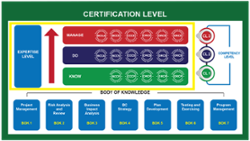Returning to the New Normal
 BCM Institute is reintroducing its on-site courses. However, due to extensive training and development enhancement work on our courses, the first two modules continue to be offered online.
BCM Institute is reintroducing its on-site courses. However, due to extensive training and development enhancement work on our courses, the first two modules continue to be offered online.
We have observed and learned that the grounding of BCM works best with some self-paced work and preparatory work undertaken by each participant.
 This is independent of the experience level. Module 1 is the "Know" competency, and Module 2 is the "Do" competency, which is completed over four weeks before commencing Modules 3 and 4.
This is independent of the experience level. Module 1 is the "Know" competency, and Module 2 is the "Do" competency, which is completed over four weeks before commencing Modules 3 and 4.
BCM Institute will continue its blended learning courses (100% online) and re-launch its hybrid learning courses with the last two modules as onsite "brick-and-mortar" courses. You will work with our senior experienced practitioners to complete the training to reach this course's "Manage" competency.
As travel restrictions are relaxed, we note that it is still challenging for our global participants to join us physically. Hence, blended learning will continue to be our main delivery mode.
Difference between Hybrid Learning [HL] with Onsite and its Blended Learning [BL] Counterpart
Current Situation. Many organizations are returning to their offices, with the new normal, which is hot desking for a few days in the office and remote working at home.
Onsite Vs Online. While professionals generally still prefer to attend an onsite classroom-based course with a facilitator or instructor being present, (electronic) online face-to-face classroom practices are fast gaining momentum and becoming acceptable.
Transformation of courses. The major change is not to have another four days of continuous web training. Firstly, we believe that learning online for more than three hours may be ineffective for the learner. Hence, the course is re-resigned in byte-sized portions to meet the objectives and learning outcomes of the advanced-level courses.
Blended Learning. BCM Institute crafted the OR-5000 Blended Learning [BL-OR-5] to answer the global requests for conducting the on-site OR-5000 Operational Resilience Expert Implementer course. The high acceptance and participation rates by professionals outside of Asia testify to our training approach's effectiveness. The major challenge is that the course is stretched over 8 to 10 weeks.
Major Change to Training Philosophy. The significant change is that participants should acquire static knowledge at their own pace and offline.
Self-paced learning depends on your experience. In module 2, the focus is to complete the mandatory content for the specific templates. This must be conducted before attending the onsite or online workshop to make the learning more effective as each of us has a different learning goal, approach, and personal experience. With these considerations, our courses are now spread for non-discussion, and non-experience sharing activities conducted offline and at your own pace.
 Hybrid Learning. The onsite learning option started in 2023, with the first two modules being online and the next two being onsite. The two physical face-to-face onsite workshops are now fully interactive with discussions with expert professionals.
Hybrid Learning. The onsite learning option started in 2023, with the first two modules being online and the next two being onsite. The two physical face-to-face onsite workshops are now fully interactive with discussions with expert professionals.
Find out more about Operational Resilience Audit ORA-5000 [ORA-5] & ORA-300 [ORA-3]

 To learn more about the course and schedule, click the buttons below for the ORA-300 Operational Resilience Audit Specialist [ORA-3] course and the ORA-5000 Operational Resilience Audit Expert [ORA-5] course.
To learn more about the course and schedule, click the buttons below for the ORA-300 Operational Resilience Audit Specialist [ORA-3] course and the ORA-5000 Operational Resilience Audit Expert [ORA-5] course.
 |
 |
 |
 |
 |
 |
 |
Please feel free to send us a note if you have any of these questions. |
 |


![Email to Sales Team [BCM Institute]](https://no-cache.hubspot.com/cta/default/3893111/3c53daeb-2836-4843-b0e0-645baee2ab9e.png)
![Banner [BL-5-Catalog] What Expert Level Blended Learning Courses that are Available?](https://no-cache.hubspot.com/cta/default/3893111/aa80bf35-e8d4-4ef6-84d4-695bb9b3a5e3.png)
![[BL-3-Catalog] What Specialist Level Blended Learning Courses that are Available?](https://no-cache.hubspot.com/cta/default/3893111/8e5be9c6-5acd-4c30-b092-f5c9284de8b9.png)

